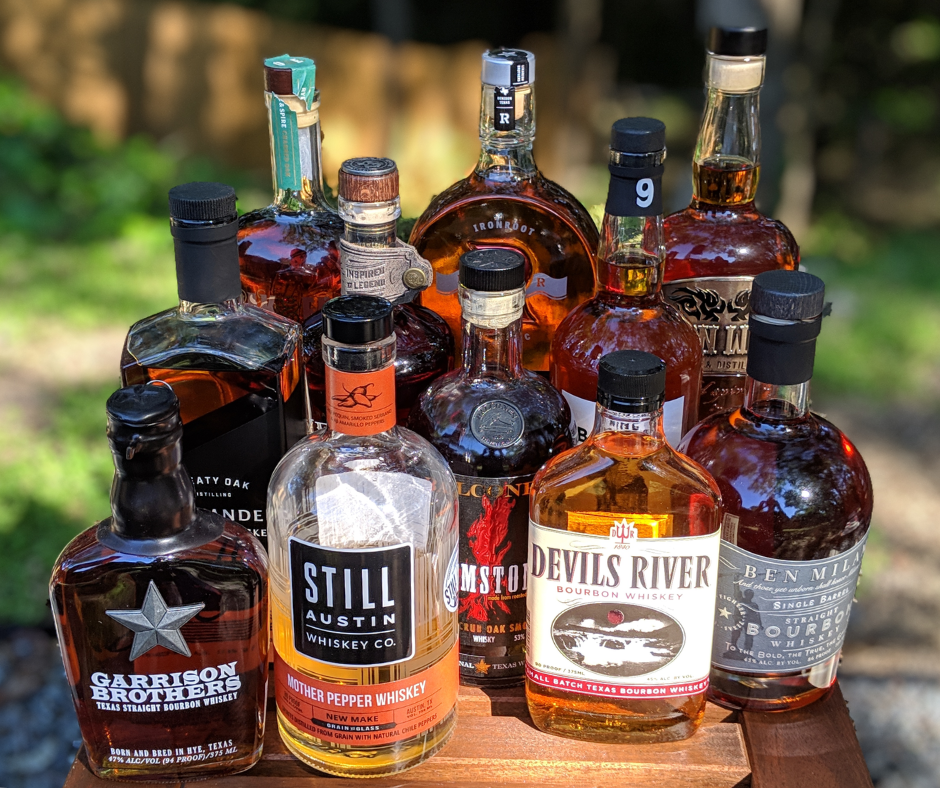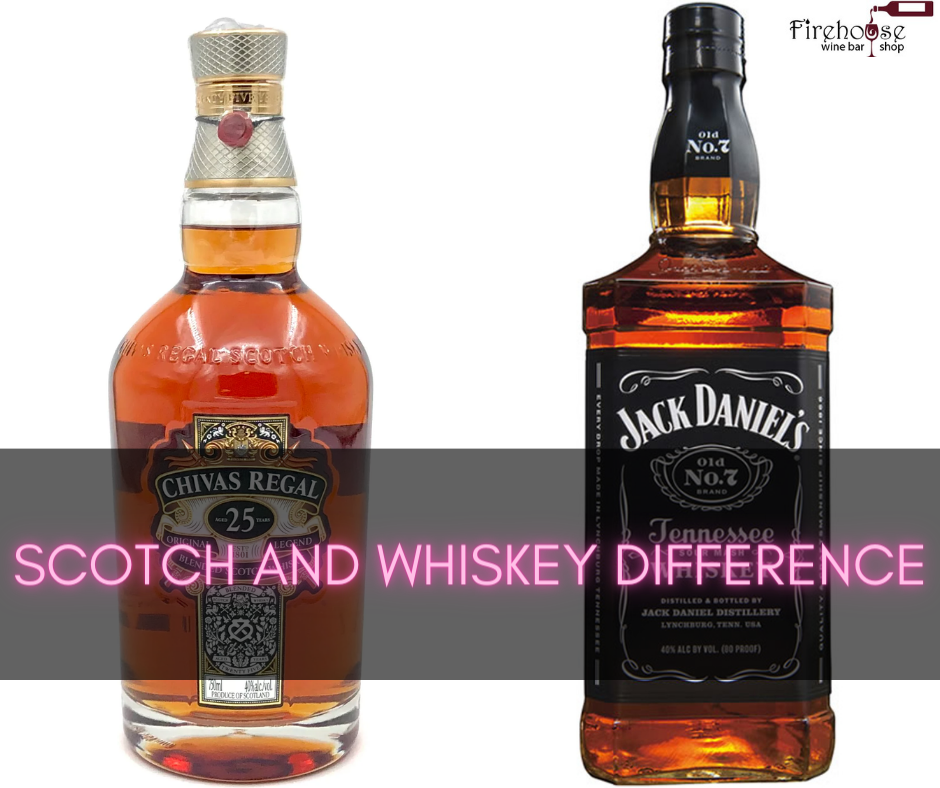Introduction
Whiskey and Scotch are two of the most popular alcoholic beverages in the world. While they may seem similar, every enthusiast should understand several key differences. This blog post will delve into the basics of whiskey and Scotch, highlighting the Scotch and Whiskey Differences.
The Basics Of Whiskey And Scotch
Whiskey is a distilled alcoholic beverage made from fermented grain mash. The primary grains used to make whiskey include barley, corn, rye, and wheat. There are many different types of whiskey, including bourbon, rye, Irish whiskey, and Scotch.
Scotch is a type of whiskey that is made exclusively in Scotland. Scotch must be distilled from malted barley and aged in oak casks for at least three years. Peat is often used during the malting process when making Scotch, giving the whiskey its distinctive smoky flavor.
Scotch and Whiskey Difference
While both whiskey and Scotch are distilled beverages made from grain, the two have several key differences. Here are four differences that set Scotch apart from other types of whiskey:
- Location: Scotch is made exclusively in Scotland, whereas whiskey can be made anywhere worldwide.
- Aging Requirement: Scotch must be aged for at least three years, while there is no minimum requirement for other types of whiskey.
- Smoky Flavor: Using peat during the malting process gives Scotch its distinctive smoky flavor, which is not found in other types of whiskey.
- Regulations: Bourbon whiskey is subject to regulations set by the US government, which include the percentage of corn in the mash bill, the proof of the whiskey, and the aging requirements. Scotch does not have these regulations.
In conclusion, understanding the differences between whiskey and Scotch is important for any enthusiast or connoisseur. Whether you prefer the smoky flavor of Scotch or the sweetness of bourbon, knowing the basics of these spirits will help you enjoy them to the fullest.

Whiskey Vs. Scotch
Whiskey and Scotch are two popular alcoholic beverages made from grains. Understanding the differences between the two is essential for enthusiasts and connoisseurs. This blog post will delve into the basics of whiskey and Scotch, highlighting the Scotch and Whiskey Differences.
Production Process And Ingredients
Whiskey is made from a mash of grains, including barley, corn, rye, and wheat. On the other hand, Scotch is made exclusively from malted barley. Peat is often used in the malting process, which gives Scotch its smoky flavor, while whiskey does not go through this process. The primary difference in production is with the ingredients used.
Location And Regulation
Scotch is exclusively made in Scotland, while whiskey can be made anywhere. Scotch must be aged in oak casks for at least three years, while other types of whiskey do not have a minimum aging requirement. Bourbon whiskey produced in the US is regulated by the government, setting requirements such as the percentage of corn in the mash bill, proof of whiskey, and aging requirements. In contrast, Scotch does not have these regulations.
In conclusion, whiskey and Scotch are popular alcoholic beverages made from grains but are produced and regulated differently. Understanding their production and regulation differences is essential to fully enjoying them. While whiskey has a broader range of flavor profiles, Scotch has a distinctive smoky flavor due to its use of peat in the malting process. The location and regulations also differentiate these two alcoholic beverages. Ultimately, the choice between the two depends on personal preference and the occasion.
Types Of Whiskey
Whiskey is a popular alcoholic beverage made from grains. Different types of whiskey are produced worldwide, each with its unique characteristics. Here are some common types of whiskey:
Bourbon
Bourbon is an American whiskey that must be made from a mash of at least 51% corn and aged in new, charred oak barrels. It has a distinct sweet and smooth taste and is mainly produced in Kentucky. Bourbon is often enjoyed neat or with a splash of water or ice.
Irish Whiskey
Irish whiskey must be made from a mash of malted and unmalted barley and aged in wooden casks for at least three years. It has a smooth and mellow taste, thanks to the triple distillation process used to produce it. Irish whiskey is often used in cocktails or enjoyed straight.
Canadian Whiskey
Canadian whiskey is a blend of different grains, including rye, wheat, barley, and corn. It is aged in wooden casks for at least three years and tastes light and smooth. Canadian whiskey is often used in mixed drinks, such as whiskey and coke or whiskey sour.
In conclusion, knowing the different types of whiskey allows enthusiasts and connoisseurs to fully appreciate and enjoy their unique characteristics. Whether it’s the sweet taste of bourbon, the mellow flavor of Irish whiskey, or the smoothness of Canadian whiskey, there is a type of whiskey for every palate.

Types Of Scotch
Scotch is a type of whiskey that is exclusively produced in Scotland. There are three main blends of Scotch, each with a unique flavor profile. Here are some common types of Scotch:
Single Malt Scotch
Single malt Scotch whiskey is made entirely from malted barley and is produced at one distillery. It is aged for a minimum of three years in oak containers. Single malt Scotch whiskey has a distinct smoky flavor from peat used during malting. It has a full-bodied taste with notes of vanilla, spices, and fruit.
Blended Malt Scotch
Blended malt Scotch is a mixture of two or more single malt whiskeys from different distilleries. It has a smooth and delicate taste with a hint of sweetness. Blended malt Scotch whiskey is perfect for those who prefer a milder flavor.
Grain Scotch
Grain Scotch is made from grains other than malted barley and is distilled in a column still. It is mixed with other types of Scotch to create blended Scotch. Grain Scotch has a lighter flavor profile than other types of Scotch.
In conclusion, knowing the different types of Scotch allows enthusiasts and connoisseurs to appreciate and enjoy their unique characteristics fully. Whether it’s the smoky taste of single malt Scotch, the mild flavor of blended malt Scotch, or the lightness of grain Scotch, there is a type of Scotch for every palate.
Flavor Notes Of Whiskey
Whiskey is a distilled spirit in various types and styles, each with unique flavors. The whiskey type, aging process, and individual distillery techniques influence its taste profile. Here are some of the tasting notes and characteristic flavors of whiskey:
Tasting Notes And Characteristic Flavors
Bourbon whiskey is known for its sweet vermouth and vanilla flavors, which come from the corn and oak barrels used in the aging process. On the other hand, Rye whiskey has a spicier and more complex profile due to the rye grains used in its mash. Blended whiskey combines different types of whiskey, and its taste depends on the proportions of each type used.
Scotch whiskey has a smoky, peaty flavor profile that distinguishes it from other types of whiskey. The malted barley used in its production is dried using peat fires, which gives it the characteristic taste. The aging process in oak barrels gives Scotch a rich and complex flavor with notes of fruit, vanilla, and spices.
Irish whiskey is known for its smooth and mellow taste, with hints of vanilla and caramel. The triple distillation process also contributes to its distinct flavor. Japanese whiskey has a delicate and nuanced flavor profile with honey, oak, and sweet spice notes.
In conclusion, understanding the different types of whiskey and their flavor profiles can help enthusiasts and connoisseurs fully appreciate and enjoy every sip. Whether it’s the sweet notes of bourbon, the smoky flavors of Scotch, or the smoothness of Irish whiskey, there is a type of whiskey out there for every taste preference.

Flavor Notes Of Scotch
Scotch whiskey is a distilled spirit with a distinct flavor profile that sets it apart from other types of whiskey. One of the defining characteristics of Scotch is its smoky, peaty taste, which comes from the malted barley used in its production and the peat fires used to dry the barley. Not all Scotches have this addition; only two of the five main producing regions are known for the peaty flavor. While drinking Scotch, one may also notice baked bread notes, nutty or cereal characteristics, and vanilla aromas.
Tasting Notes And Characteristic Flavors
Scotch whiskey has a complex and rich flavor profile. The aging process in oak barrels gives it notes of fruit, vanilla, and spices. The type of oak barrel used also influences the flavor of Scotch. American oak barrels offer more vanilla and caramel flavors, while European oak barrels offer more spicy and floral notes. The peaty flavors in Scotch give it a smoky and earthy taste, and the malted barley can also contribute nutty, caramel, or biscuity flavors.
The different regions of Scotland that produce Scotch also offer unique flavor notes. For example, the Highlands region produces a sweeter, fruitier style of Scotch, while the Islay region produces a more robust and smoky style.
In conclusion, understanding the different types of whiskey and their flavor profiles can help enthusiasts and connoisseurs fully appreciate and enjoy every sip. Scotch whiskey has a unique flavor profile that offers a range of complex and rich taste notes. There is a Scotch whiskey for every taste preference, from the smoky and peaty flavors to the fruity and spicy notes. Try different Scotch whiskey brands and regions to discover each bottle’s flavor profile.
Pairing With Whiskey
Food Pairings And Complements
Scotch whiskey is a unique spirit with a distinct flavor profile that sets it apart from other types of whiskey. Knowing how to pair it with food can be helpful to appreciate and enjoy its flavor fully. When pairing whiskey and food, it’s essential to consider the whiskey’s style and flavor notes rather than its category. Sweeter varieties go well with spicy dishes, lighter ones with seafood, and full-bodied ones with rich and well-flavored foods.
For example, when it comes to meats, full-bodied Scotch whiskey can balance the flavors of a chargrilled steak by accentuating its smoky notes. A smooth bourbon aged in a cabernet cask can pair beautifully with lean grilled beef, while Scotch with more peat would need dishes with bold smokiness, such as dry-aged beef or duck.
Adding oranges to a whiskey can lighten it and bring out its flavors. Pairing it with whiskey can be delicious if you enjoy orange-flavored chocolate. Fresh fruits such as ripe pears and sliced apples can bring out the complexities of Scotch whiskey, while dried fruits like figs and dates can complement Tennessee whiskey and other caramel-flavored varieties.
In conclusion, understanding how to pair whiskey and food can enhance both flavors. When pairing whiskey, consider its style and flavor notes, and experiment with different food combinations to find what works best for your taste preferences. With its unique flavor profile, Scotch whiskey offers a range of taste notes that connoisseurs and enthusiasts can enjoy fully when paired with the right foods.
Pairing With Scotch
Food Pairings And Complements
Scotch whiskey has a unique flavor profile that sets it apart from other types of whiskey. Pairing it with food can enhance its flavor and bring out its complexities. When pairing whiskey and food, it’s important to consider the whiskey’s style and flavor notes rather than its category. Sweeter varieties go well with spicy dishes, lighter ones with seafood, and full-bodied ones with rich and well-flavored foods.
For instance, full-bodied Scotch whiskey can accentuate its smoky notes beautifully to balance the flavors of a chargrilled steak. A smooth bourbon aged in a cabernet cask can pair nicely with lean grilled beef, while Scotch with more peat would complement dishes with bold smokiness, such as dry-aged beef or duck.
Adding oranges to a whiskey can lighten it and bring out its flavors. Pairing orange-flavored chocolate with whiskey can also make for a tasty treat. Fresh fruits such as ripe pears and sliced apples can bring out the complexities of Scotch whiskey, while dried fruits like figs and dates can complement Tennessee whiskey and other caramel-flavored varieties.
In conclusion, understanding how to pair whiskey and food can enhance the flavor of both. When pairing whiskey, it’s important to consider its style and flavor notes and to experiment with different food combinations to find what works best for one’s taste preferences. With its unique flavor profile, Scotch whiskey offers a range of taste notes that connoisseurs and enthusiasts can enjoy fully when paired with the right foods.
Conclusion
If you’ve ever wondered about the Scotch and whiskey difference, the answer lies primarily in geography and the distillation process. While whiskey can be made anywhere using various grains, Scotch is made in Scotland, specifically from malted barley and water. On the other hand, Irish whiskey comes from a sour mash of malted cereal grains like corn, barley, and wheat. The biggest difference is in the distillation process, as Scotch is distilled twice as Irish whiskey is thrice. So the next time you’re enjoying a glass of Scotch or whiskey, remember that they may be similar, but each has unique distinctions that make it stand out.
Choosing The Right Whiskey Or Scotch
When choosing the right whiskey or Scotch, the first consideration is personal taste and preference. Different styles, flavors, and characteristics cater to different palates, so finding the one that resonates best with the individual is essential.
Scotch spirits come in various styles and flavors to suit different drinkers’ preferences. Single malt scotch offers a complex and unique flavor profile, while blended scotch provides a milder taste and more affordable pricing options. Bourbon is America’s contribution to whiskey and offers a sweeter profile than most whiskeys. Rye whiskey is spicier and pairs well with cocktails and mixers.
Final Thoughts And Recommendations
Scotch whiskey offers an unparalleled drinking experience with its unique flavors and complexities. Pairing it with the right food can bring out the best of its flavor profile, elevating the experience to new heights. With careful consideration and experimentation, drinkers can find the right whiskey or Scotch has a unique taste that resonates with them.
FAQ: The Whiskey Chronicles: Understanding Scotch Distinctions
Q: What is the difference between Scotch and whiskey?
A: Scotch is a type of whiskey specifically produced in Scotland. Whiskey, on the other hand, is a broader term that refers to distilled spirits made from fermented grain mash.
Q: What grains are used in the production of Scotch?
A: Scotch is primarily made from malted barley. However, other grains, such as wheat or corn, may be included in varying quantities.
Q: Can Scotch be made outside of Scotland?
A: No. In order to be called Scotch, the whiskey must be distilled in Scotland following specific regulations and aging requirements set by the Scotch Whisky Association.
Q: What are the main types of Scotch?
A: There are different types of Scotch based on the production process and ingredients used. The main types include Single Malt Scotch Whisky (made entirely from malted barley), Single Grain Scotch Whisky (made from various grains), Blended Malt Scotch Whisky (a blend of single malt whiskies), Blended Grain Scotch Whisky (a blend of grain whiskies), and Blended Scotch Whisky (a mix of malt and grain whiskies).
Q: How is Scotch different in terms of flavor compared to other whiskeys?
A: Scotch often has a distinct smoky flavor due to the use of peat during the malting process. However, the flavor profiles can vary greatly within the different types of Scotch, ranging from light and floral to rich and full-bodied.
Q: What is the significance of the aging process in Scotch production?
A: The aging process plays a crucial role in developing the flavors and characteristics of Scotch. It must be aged in oak casks for a minimum of three years, although many Scotch whiskies are aged for much longer. The duration and type of cask used greatly impact the final product.
Q: Can Scotch be enjoyed in cocktails?
A: Absolutely! While many people savor Scotch neat or on the rocks, it can also be a great base spirit for various cocktails, such as the classic Scotch Sour or the Rob Roy.
Q: Can you recommend some popular Scotch brands?
A: Certainly! Some well-known Scotch brands include Glenfiddich, Macallan, Glenlivet, Lagavulin, Talisker, and Laphroaig. Each brand offers a unique flavor profile and caters to different preferences.
Q: Is Scotch considered an expensive spirit?
A: The price range for Scotch can vary significantly depending on factors such as age, rarity, and brand reputation. While some Scotches can be quite expensive, there are also affordable options available for those who want to explore the world of Scotch without breaking the bank.
Q: Are there any regional differences in Scotch production?
A: Yes, different regions in Scotland have distinct characteristics in their Scotch production. For example, Islay whiskies are known for their intense and smoky flavors, while Speyside whiskies often exhibit fruity and floral notes. Other regions, such as Highland, Lowland, and Campbelltown, also contribute to the diversity of Scotch flavors.

Andre Lotz immigrated to the United States from South Africa almost 20 years ago. Still, he didn’t feel truly at home until he settled in Mobile—a city that reminds him of his childhood home of Fish Hoek on the southern cape of Africa.

